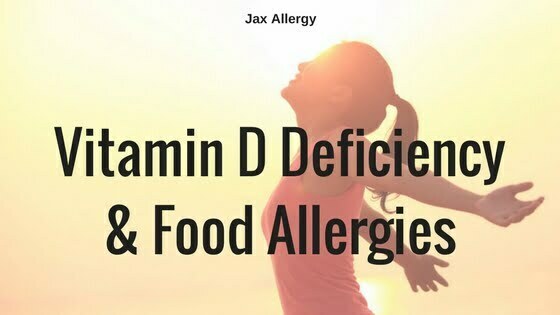Vitamin D Deficiency and Food Allergies: Does One Relate to the Other?

Food allergies are becoming an epidemic in today’s societies with a noticeable increase in cases in just the last decade. In the U.S. and Australia alone, 10% of infants 12 months old have been clinically diagnosed with a food allergy.
Just as food allergies increased, levels of vitamin D decreased. It’s estimated that 50% of the population in Western countries lack sufficient levels of vitamin D with 10% of the population are deficient in vitamin D.
This makes researchers wonder, could there be a correlation between food allergies and vitamin D?
Benefits of Vitamin D[1]
Vitamin D is often known as the “sunshine vitamin” because it is absorbed by the skin. It is also absorbed by eating certain foods or taking supplements.
Oily fish including salmon, sardines, and tuna have the richest sources of vitamin D. Other good sources include egg yolks, liver, and foods specially fortified with vitamin D.
Vitamin D is an essential nutrient to support healthy body functions. Sufficient levels of vitamin D helps:
- Regulate calcium and phosphorus absorption to support healthy bones and teeth
- Protect against diseases such as type 1 diabetes, hypertension, cancer, and multiple sclerosis
- Support brain health, the nervous system, and the immune system
- Aid in cardiovascular health and lung function
Symptoms of Vitamin D Deficiency[2]
How do you know if you are vitamin D deficient? Many people don’t develop symptoms until their levels are low for a while. This can make vitamin D deficiencies hard to diagnose.
Common symptoms include:
- Bone pain
- Frequent bone fractures
- Muscle weakness
- Difficulty forming clear thoughts
- Depression
Low levels of vitamin D can lead to more severe health issues such as:
- Cardiovascular disease
- Cancer
- Cognitive impairment in older adults
- Asthma in children
Can Vitamin D Affect Food Allergies? What the Research Says
Studies show locations further away from the equator (areas lacking ultraviolet radiation (UVA)) have higher rates of child food allergy-related hospital visits, peanut allergies, and epinephrine prescriptions. In addition, being born in the fall or winter with less UVA exposure relates to higher risks of food allergies and anaphylaxis in children.
Diet can also be a contributing factor. An Australian study found that children who were introduced to eggs after six months of age had a higher risk for food allergy than infants who were introduced to eggs when they were 4-6 months.
What This Means for You
The research comparing vitamin D deficiencies to food allergies is not conclusive and more research is needed to know if vitamin D can reverse food allergies. What we do know is vitamin D can protect against food allergies and is critical for your overall health and well-being.
If you think you may be vitamin D deficient, your doctor can assess your levels by a simple blood test and recommend supplements. Only take supplements under the care of health care professionals such as your primary care physician or allergist.
If your child is experiencing food allergy symptoms, schedule an appointment with the Jacksonville Allergy & Asthma Specialists for allergy testing. Call us at 904-730-4870 if you have questions about food allergies.
References:
[1] http://www.webmd.com/food-recipes/features/vitamin-d-vital-role-in-your-health#1
[2] https://medlineplus.gov/vitaminddeficiency.html
